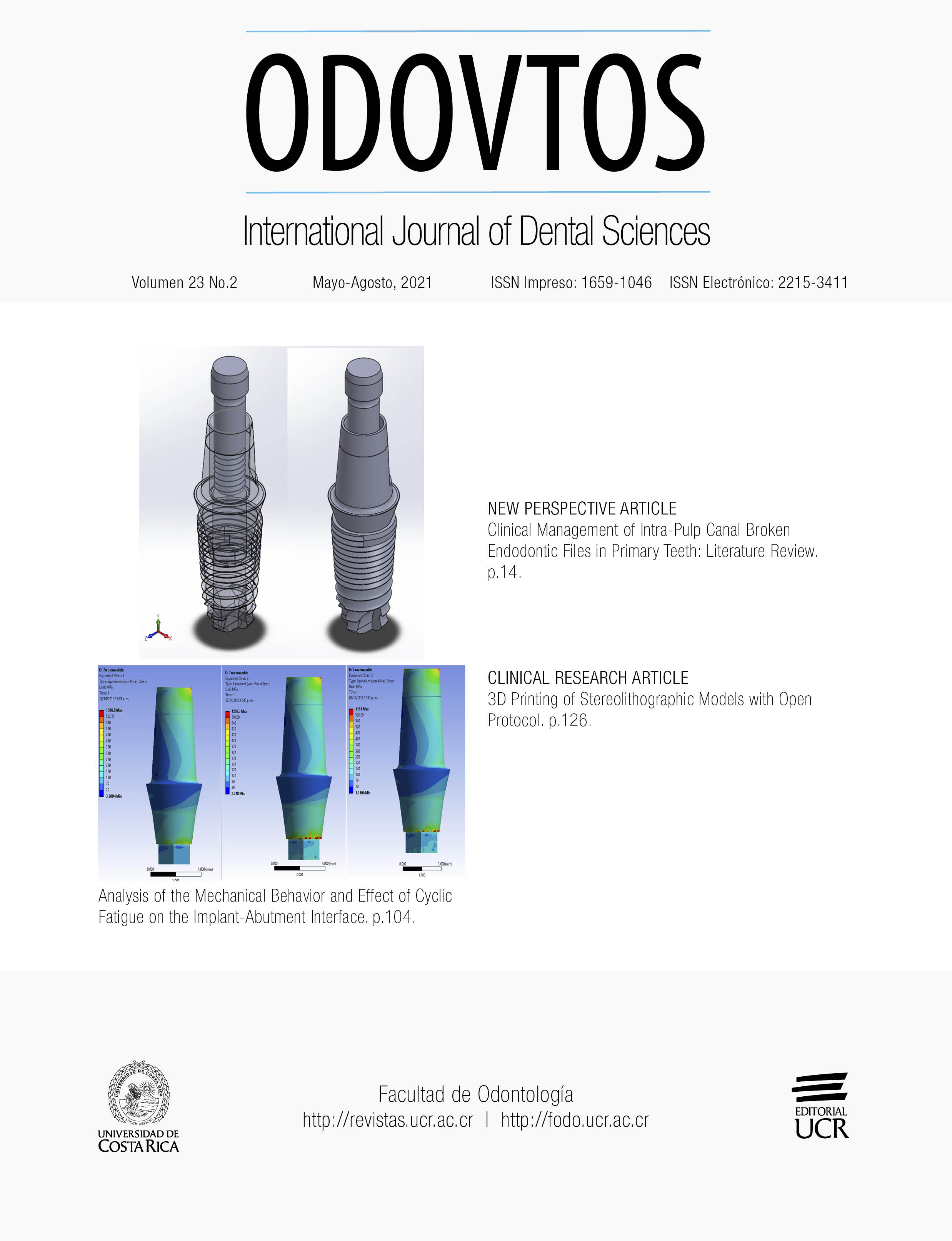Abstract
A descriptive and exploratory study was carried out with the aim of proposing and validating an open protocol for making 3D impressions of stereolithographic models, which is available to professionals in the area of Dentistry. Nine operators (senior students of the Dentistry degree), without previous experience in the use of software and hardware for 3D printing, divided into two groups were trained through theoretical and practical sessions. The A worked with three helical tomographies (TAC) and the B with three cone beam computed tomography (CBCT), all in DICOM format, converted to STL files. In total, 99 bone structures corresponding to 33 jaws, 33 axis and 33 facial masses-skull bases were analyzed, and a total of 33 jaws were printed in PLA (polylactic acid filament). At the end of the study, no statistically significant difference was found in the implementation of the proposed protocol between the operators, the measurements of the pieces printed by each of them, the gold standard, the TAC and the CBCT, with which not only validated the protocol, but it was possible to determine the resources necessary to carry out this type of 3D printing.
References
Anderson J., Wealleans J., Ray J. Endodontic applications of 3D printing. International Endodontic Journal. 2018; 1-14.
Bortz J., Ramlaul A., Munro L. CT Colonography for Radiographers. Suiza: Springer International Publishing AG Switzerland, 2016.
Burgess J. Digital dicom in dentistry. The Open Dentistry Journal. 2015; 9 (2): 330-336.
Chae M., Rozen W., McMenamin P., Findlay M., Spychal R., Hunter D. Emerging applications of bedside 3D printing in plastic surgery. Frontiers in surgery. 2015 Jun; 2 (25): 1-14.
Chandran S., Sakkir N. Implant-supported full mouth rehabilitation: a guided surgical and prosthetic protocol. Journal of Clinical and Diagnostic Research. 2016 Feb; 10 (2): ZJ05-ZJ06.
Chan K., Coen M., Hardick J. Low-cost 3D printers enable high-quality and automated sample preparation and molecular detection. Plos One. Estados Unidos de América, Maryland. 2016; 11: (6) 1-19.
Islas M., Noyola M., Martínez R., Pozos A., Garrocho A. Fundamentals of stereolithography, an useful tool for diagnosis in dentistry. ODOVTOS. 2015; 17 (2): 15-21.
Lee C. Medical applications for 3D printing: current and projected uses. Pharmacy and Therapeutics. 2014 Oct; 39 (10): 704-711.
Mittal R., Tripathi S. A review in stereolithography and its biomedical applications. Guident. 2015 Jun; 14-18.
Nayar S., Bhuminathan S., Manzoor, W. Rapid prototyping and stereolithography in dentistry. Journal of Pharmacy and Bioallied Sciences. 2015 Apr; 7 (1): 216-219.
Rebong R., Stewart K., Utreja A., Ghoneima A. Accuracy of three dimensional dental resin models created by fused deposition modeling, stereolithography, and polyjet prototype technologies: a comparative study. Angle Orthodontits. 2018 Mar; 00 (00): 1-7.
Sikri A., Sikri A., Sikri A. RAM new breakthrough in dentistry. The IDA times. 2016 Nov; 1-3.
Thakkar V., Kolte D., Solanki N., Aidasani G. Stereolithography an overview. JIDA. 2014 Jan; 8 (1): 18-21.
Yadav Y., Kumar P., Kumar S., Chari H. Stereolithography a diagnostic tool in oral and maxillofacial surgical treatment planning. Indian Journal of Dental Advancements. 2017 Jun; 9 (2): 98-100.
Zuluaga F. Algunas aplicaciones del ácido poli-L-láctico. Revista Académica Colombiana de Ciencias Exactas, Físicas y Naturales. 2013 Mar; 37 (142): 125-142.

